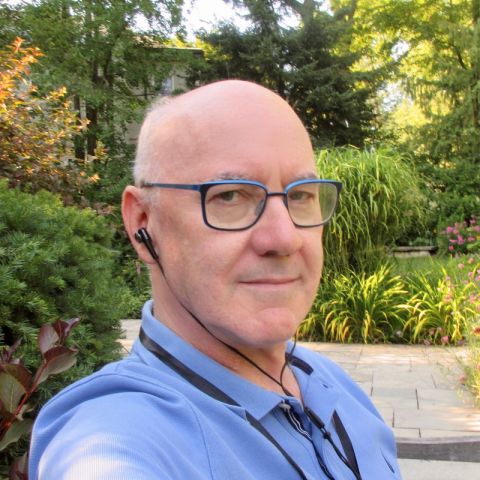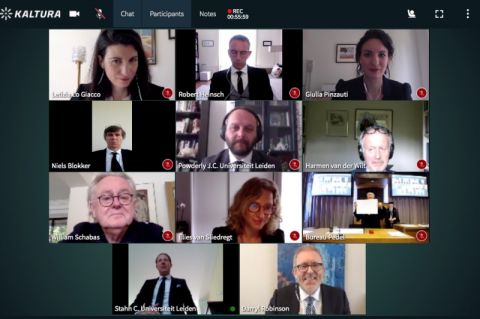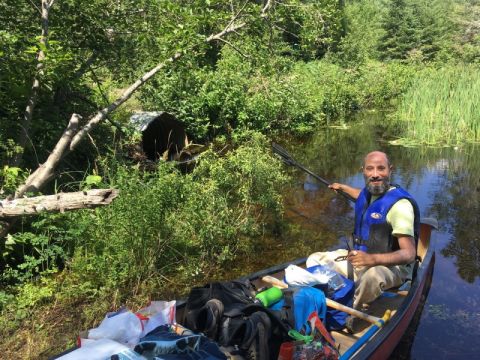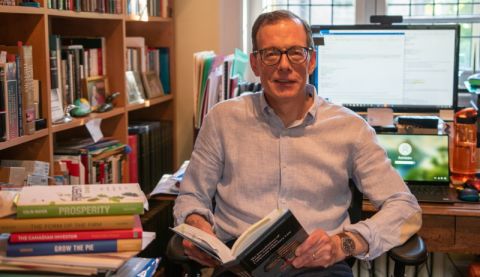





While designing a number of fall-term courses for remote delivery has been a top priority for faculty members, not even COVID-19 could stop them from also working on exciting research projects this summer. These projects range from Canada’s new self-defence law and the rule of law to climate change and economic globalization – and several of them address legal challenges arising from the coronavirus.
Here is just a sample of their latest work.
Dean Mark Walters put the final touches on his book, A.V. Dicey and the Common Law Constitutional Tradition: A Legal Turn of Mind, which will be published in October by Cambridge University Press. He also completed a chapter examining the “Oka Crisis” of 1990 from a legal perspective. This chapter will appear in the Canadian State Trials series published by the Osgoode Society for Canadian Legal History.
Professor Martha Bailey taught Contract Law at Laval University and wrote a paper, “Developments in Family Law,” for the Supreme Court Law Review.
Professor Nick Bala gave webinar presentations to lawyers, judges, and mental health professionals in Ontario, across Canada, and internationally on: the COVID-19 shutdown and urgent family orders; children resisting contact and parental alienation; and the use of the Ontario Parenting Plan Guide. He also worked on two published, co-authored casebook projects: a new edition of the Contracts casebook (LexisNexis), being published this month; and the next edition of the Family Law casebook (Thomson), with Professor Mary-Jo Maur and fellow Queen’s Law grad (now a Western Law professor) Claire Houston, which will be published next summer. In addition, he made progress on projects and articles on high-conflict separations, including domestic violence issues; the role of children in family cases; and access to family justice, including the contentious family law paralegal issue.
Professor Kevin Banks wrote an article on the purposes of labour chapters in free trade agreements; planned and organized upcoming workshops and panel series on the Supreme Court’s decisions in Vavilov v. Canada and Uber v. Heller (jointly with Professors Josh Karton and Alyssa King), and on reopening workplaces during the COVID-19 pandemic. He also participated in an online panel on the Uber decision hosted by the Canadian Journal of Commercial Arbitration, initiated a literature review on the impacts of economic and technological change on working conditions, and prepared a presentation to the Queen’s International Institute on Social Policy on gaps in workplace law.
Professor Benjamin Ewing has been working on an article entitled “Affirmative Action in Criminal Justice.” In it, he argues that disadvantaged offenders who have lacked a fair opportunity to avoid criminal wrongdoing should receive mitigated sentences as a form of compensatory “affirmative action.” Another work, which is in an earlier stage of development, will consider whether the state may lack the moral standing to blame offenders who have faced criminogenic injustice at the state’s hands.
Professor Les Green wrapped up a year’s sabbatical from Queen’s and Oxford, spent mainly in Toronto. He wrote a book, The Germ of Justice, to appear in 2021, and co-edited another, Oxford Studies in the Philosophy, vol IV, with Brian Leiter. His article, “Feminism and the Analytic Jurisprudential Mind” (which began as a Queen’s “work in progress”), was published in the Modern Law Review, and another, “Positivism, Realism, and the Sources of Law,” in The Cambridge Companion to Legal Positivism. His blog, Semper Viridis, was a site of lively discussions about COVID, free speech, and more.
Debra M Haak, PhD’19, joined Queen’s as a Post-Doctoral Fellow in July. Her research project, “Not All Women: Individual and Group Rights Under the Canadian Charter,” considers the decisions in the first two constitutional challenges to Canada’s new criminal prostitution laws to critically examine how the courts contend with conflicting claims about how to protect women’s rights. Most recently, she completed an article on the limits of empirical evidence about prostitution, sex work, and sex trafficking in Canada and is finishing up an article that considers the use of reasonable hypotheticals in Section 7 Charter cases. Her research is funded by the Queen’s Research Opportunities Fund and is supervised by Professors Lisa Kelly and Bev Baines.
Associate Dean Josh Karton, Managing Editor of the Canadian Journal of Commercial Arbitration (CJCA) that officially launched in June, edited every article in the inaugural issue. He also organized and moderated the two successful webinars that the CJCA hosted. In another ambitious editing project, he began serving as General Editor of Kluwer Arbitration Practice Plus, a new online compendium of practical guidance on every aspect of international arbitration practice. In addition, he continues to oversee graduate studies and research for Queen’s Law.
Professor Alyssa King worked on several articles and on revamping her classes for online delivery. She has enjoyed virtual meet-ups with civil procedure colleagues from the U.S. and Canada and has been on several panels discussing developments in arbitration law. Stay tuned for a series of workshops on Uber v Heller, jointly sponsored by the Center for Law in the Contemporary Workplace and the Canadian Journal of Commercial Arbitration.
Professor Erik Knutsen published a new version of his American insurance law casebook, Principles of Insurance Law (5th edition), with co-author Jeff Stempel. He is also working on the next edition of co-authored civil procedure casebook The Civil Litigation Process (9th edition), as well as updates to his insurance law treatise Stempel & Knutsen on Insurance Coverage.
Professor Nicolas Lamp and his co-author, Professor Anthea Roberts of Australian National University, finished the manuscript of their book Winners and Losers: Narratives about Economic Globalization, which is scheduled to be published in 2021.
Professor Mary-Jo Maur has been working on two projects from her home office located in “the wilds of Odessa, Ontario,” after getting up early each day to ride her beloved horses. In addition to co-authoring a new edition of the Family Law casebook with Professor Bala and with Western Law professor Claire Houston (noted above), she has been writing a paper on tort claims in family law cases that is proving to be “really interesting and challenging.”
Professor Cherie Metcalf started her research sabbatical, published a co-authored empirical article on the effectiveness of fines vs. social norms for enforcing rules in the International Review of Law & Economics, and had a co-authored paper accepted at the Northwestern University Law Review that used lab experiments to test the deterrent effect of tort law. With recent grants from the Social Sciences and Humanities Research Council and the Canadian Foundation for Legal Research, she worked with “wonderful Queen’s JD students” as RAs this summer on a new project on climate change. She will present related work this fall in a “Virtual Law & Economics” seminar series co-hosted by Florida, Michigan and Virginia Law.
Professor Patricia Peppin wrote a paper on the constitutional position of physicians’ conscientious refusals to provide effective referrals for health care in such cases as medical assistance in dying (MAID) and abortion, in relation to patients’ rights and equitable access to health care. She has also carried out research on vaccine refusals in North America, looking particularly at the rationales given for permitting such refusals of vaccines, for children and adults, in the context of the community’s interest in herd immunity.
Professor Darryl Robinson completed a monograph with Cambridge University Press, Justice in Extreme Cases: Criminal Law Theory Meets International Criminal Law (2020). The book has already been the subject of a symposium of leading North American scholars in the field. He also wrote about environmental crimes as crimes against humanity, and in May, he completed a PhD on criminal law theory and command responsibility at Leiden University in the Netherlands.
Professor Don Stuart completed the eighth edition of Canadian Criminal Law: A Treatise. He also continues editing two publications issued every three weeks: the Criminal Reports and the NJI Criminal Essentials eletter for 1,300 judges.
Professor Grégoire Webber completed a chapter on opposition for the Cambridge Handbook of Constitutional Theory, jointly published an authors’ reply in a book symposium devoted to his jointly authored Legislated Rights (CUP 2018, pb 2019) published by the Jerusalem Review of Legal Studies, reviewed the proofs of his 2019 Chevrette-Marx Lecture to be published as Droits et droit by Les Éditions Thémis, published “The duty to govern and the Rule of Law in an emergency” in the open-access volume Vulnerable: The Law, Policy, and Ethics of COVID-19 (University of Ottawa Press, 2020), drafted and submitted an article defending an interpretation of the Charter’s notwithstanding clause that does not preclude judicial review, and continued to work on his manuscript on human goods and human laws.
Professor Jacob Weinrib published an article in the Oxford Journal of Legal Studies. His forthcoming articles will appear in the Supreme Court Law Review, Modern Law Review, and Jurisprudence, which is hosting a symposium on his book, Dimensions of Dignity: The Theory and Practice of Modern Constitutional Law.
Professor Noah Weisbord and his student research team conducted a study of every self-defence appeal case under Canada’s new self-defence law in order to determine how the law has been interpreted and applied and whether it is indeed as vulnerable to capricious application as Florida’s notorious “Stand Your Ground” law. This research has been submitted for law review publication and is intended to assist the Supreme Court of Canada in deciding an important new self-defence appeal case, R. v. Khill. He also served as an advisor on the Council of Advisers on the Application of the Rome Statute to Cyberwarfare, finalizing a report that will help states understand how international criminal law applies to cyberwar.
Professor Robert Yalden finalized an article, forthcoming in the Canadian Business Law Journal, on the regulation of defence strategies in mergers and acquisitions transactions. He also completed a review of David Kershaw’s The Foundations of Anglo-American Corporate Fiduciary Law (2018) and is working on an article comparing amendments introduced into Quebec’s corporate law in 2010 to facilitate the use of sole shareholder corporations with simplified corporation models seen in several Latin American countries. His other projects included hosting a roundtable discussion with other Canadian corporate law academics on current issues in Canadian business law and adapting Business Associations and Structuring Business Transactions courses for online teaching.
By Lisa Graham